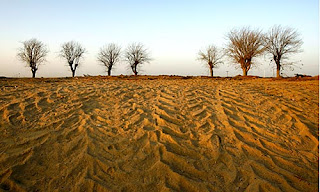The economic crisis ranges in titles from the hilarious "economic
shitstorm" to the more somber "global economic readjustment." I like the former because it is descriptive of the havoc the crisis wrecks in individual lives. It captures the anxiety, worry and, ultimately, the sense that what we're experiencing is so profound, nothing will ever be the same again. The latter sounds like an economist's
euphemism that obscures more than it describes. And it undoubtedly does just that. "Readjustment" is similar to the more
familiar and hated "restructuring." When the unemployed are feeling glib they say "I was restructured" to that they were laid off. That said, I like "readjustment" because, while it is not as colorful, it gets to something deeper: something went wrong with the fundamentals of our (really, the world's) market economy.
Whether you are talking about the stocks that make up you 401k, the value of your home or the grievous errors in judgment that your banker made in the past several years, the issue at stake is the fact that, at some point, the wheels left the pavement. That is, the value of the stock, home or bundled securities simply did not reflect its real market value. Profitless companies were able to sell shares of stock for more value than they really held. Houses were sold at inflated prices to customers who could not afford them; this was based on the crazy logic that they would forever increase in value. And the bundled securities, or derivative, market was a ponzi scheme based on misinformation (perhaps willful ignorance) and speculation.
In fact, that is what the "readjustment" is all about: it is a period where values finally begin to reflect reality. Until we can eliminate the very human tendency to speculate and act according to expectations (which can be based on everything from very solid information to wishful thinking to calculated lies), markets will never be just markets. They, like the commodities they trade, will always hold a fetishistic attraction for us: "it's more than just a home/stock/derivative, it's an investment."
As things get worse (a mantra we've heard a million times now, followed by "before they get better"), they are also getting more real: things are readjusting. Your home is finding a market value for which a loan can be had--the same goes for the stocks in your retirement fund and the bundled securities held by your bank. Of course, this is little consolation if you've lost your job/home/savings. And it is high price to pay for the trillions of little lies and bubble-headed fantasies that have landed us in this mess. Unfortunately, most of us are complicit to some degree in the collective delusion that washed over the industrialized world for the last decade and a half.
Just as speculation and loose financial practices can inflate value, it goes the other way as well. Expectation of future losses can drive values below the point at which they would normally reside. Time is the only remedy...we've got to wait it out. The best we can hope for is an economic system that, post-readjustment, is characterized by more honesty, transparency and rationality. So, as we press on through this shitstorm together, just remember that, without a doubt, the end is nearer.

